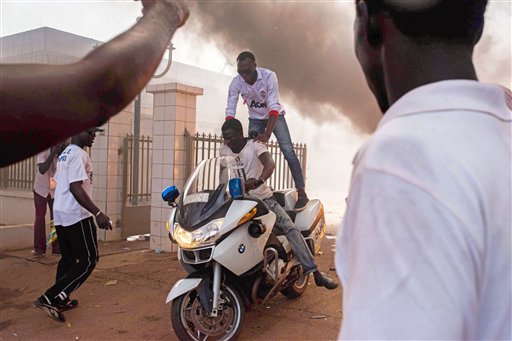OUAGADOUGOU, Burkina Faso (AP) — Burkina Faso’s military said Monday it will hand over to a transitional government under a leader chosen by all sectors of society to fill the power vacuum created since long-time President Blaise Compaore resigned and fled amid violent protests.
The military appears to be in control as the opposition dropped its demands for the soldiers to cede power.
Lt. Col. Isaac Yacouba Zida, the military’s designated leader, met with diplomats and African leaders and announced the country will be led by “a transitional body within the constitutional framework.” Zida, the No. 2 in the Presidential Guard, did not specify that the proposed leader would be a civilian and did not provide a timetable.
The African Union’s Peace and Security Council decided Monday to give the military two weeks to return the country to constitutional rule or face sanctions.
“No sanctions on #BurkinaFaso, for now. But Military must handover to civilian Transition Gov’t, or else…” according to its Twitter account.
The opposition made a major concession, halting demands for the military to immediately surrender power. It said the way to a democratic transition can only be achieved through “an extensive consultation involving all democratic and social forces in the country and all the country’s institutions, including our national army,” according to a statement issued on its behalf by politician Zephirin Diabre.
It was unclear why opposition politicians changed their stance, given the support of the United Nations, the African Union, the United States and the European Community, who all condemned the military power grab — even though no one is calling it a coup.
Calling it that could have legal consequences, including cuts in military aid from the United States.
“We would call again for a civilian-led transition that follows the spirit of the constitution” and quickly organizes democratic elections, U.S. State Department spokeswoman Jen Psaki said Monday.
U.N. Secretary-General Ban Ki-moon said he hoped ongoing dialogue would bring “a peaceful and democratic transition arrangement” to restore constitutional order.
Ouagadougou, the capital, was calm Monday and soldiers were off the streets following days of unrest.
The anti-government protests began Thursday when demonstrators set the legislature ablaze to prevent a vote to allow Compaore to seek another term of office. Compaore had been in power for 27 years.
On Sunday, protesters demanded the military cede power after soldiers named Zida head of a transitional government. The opposition faces a dilemma. According to the constitution, the leader of the House of Assembly becomes the transitional leader in the absence of a president. But that man is a close ally of Compaore and his deputy in the ousted ruling party.
He and about 30 other legislators have sought safety at the main police station in Ouagadougou, the capital of Burkina Faso, which means “Land of the Upright Man.”
An impoverished and landlocked West African country, its name was changed from Upper Volta when Compaore and his best friend, Thomas Sankara, staged a palace coup in 1983 and ousted a moderate military faction to mount a major leftist revolution. The country had been under military rule since 1966, just six years after independence from France.
Compaore staged his own coup in 1987, a bloody affair in which Sankara was assassinated, discredited by disfavor over his austere Marxist measures and the thuggish behavior of his followers. Compaore initially ruled in a triumvirate but in 1989 charged his co-leaders with treason and organized their summary executions.
A new constitution supposed to restore democracy was adopted in 1991. Compaore won every election, easily beating a divided opposition despite growing discontent, including in the military. But resentment grew to his extended rule.
Compaore’s sudden departure Friday — a convoy of vehicles high-tailed it to neighboring Ivory Coast — has left the country of 17 million, its political parties and military grappling to establish a new government.
___
Associated Press writers Matthew Lew in Washington and Ron DePasquale at the United Nations contributed to this report.

COMMENTS
Please let us know if you're having issues with commenting.